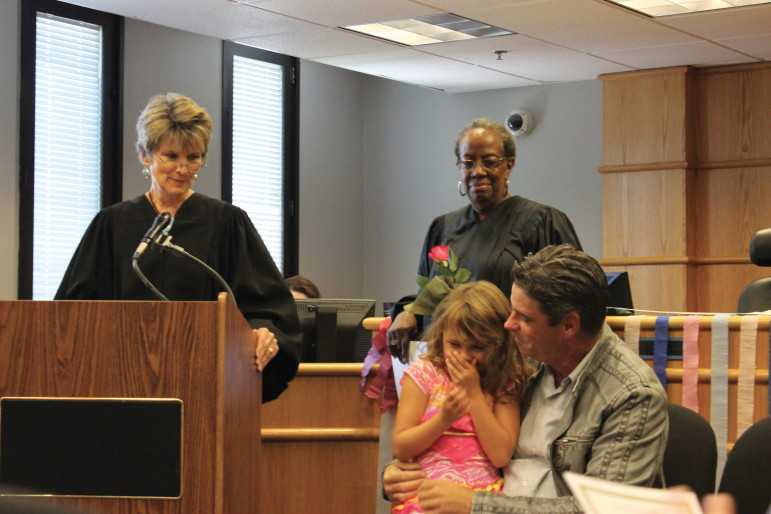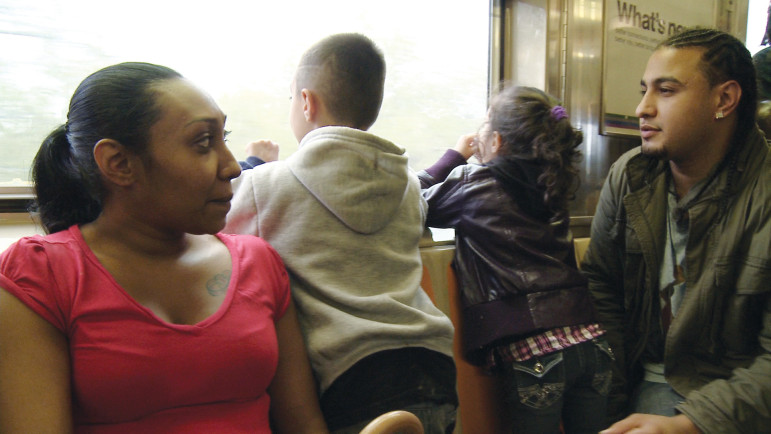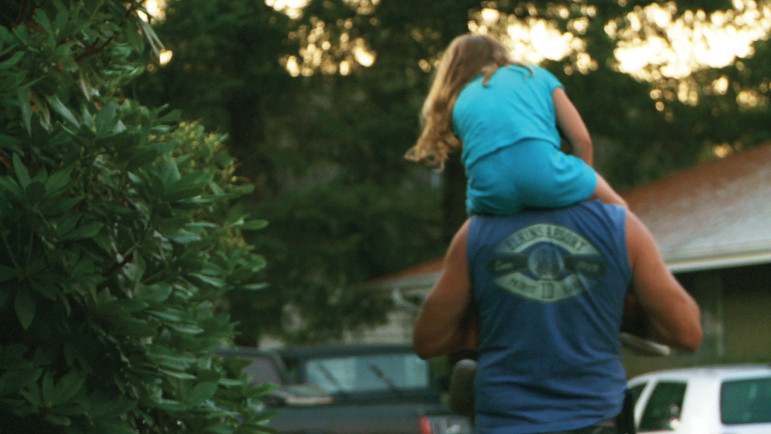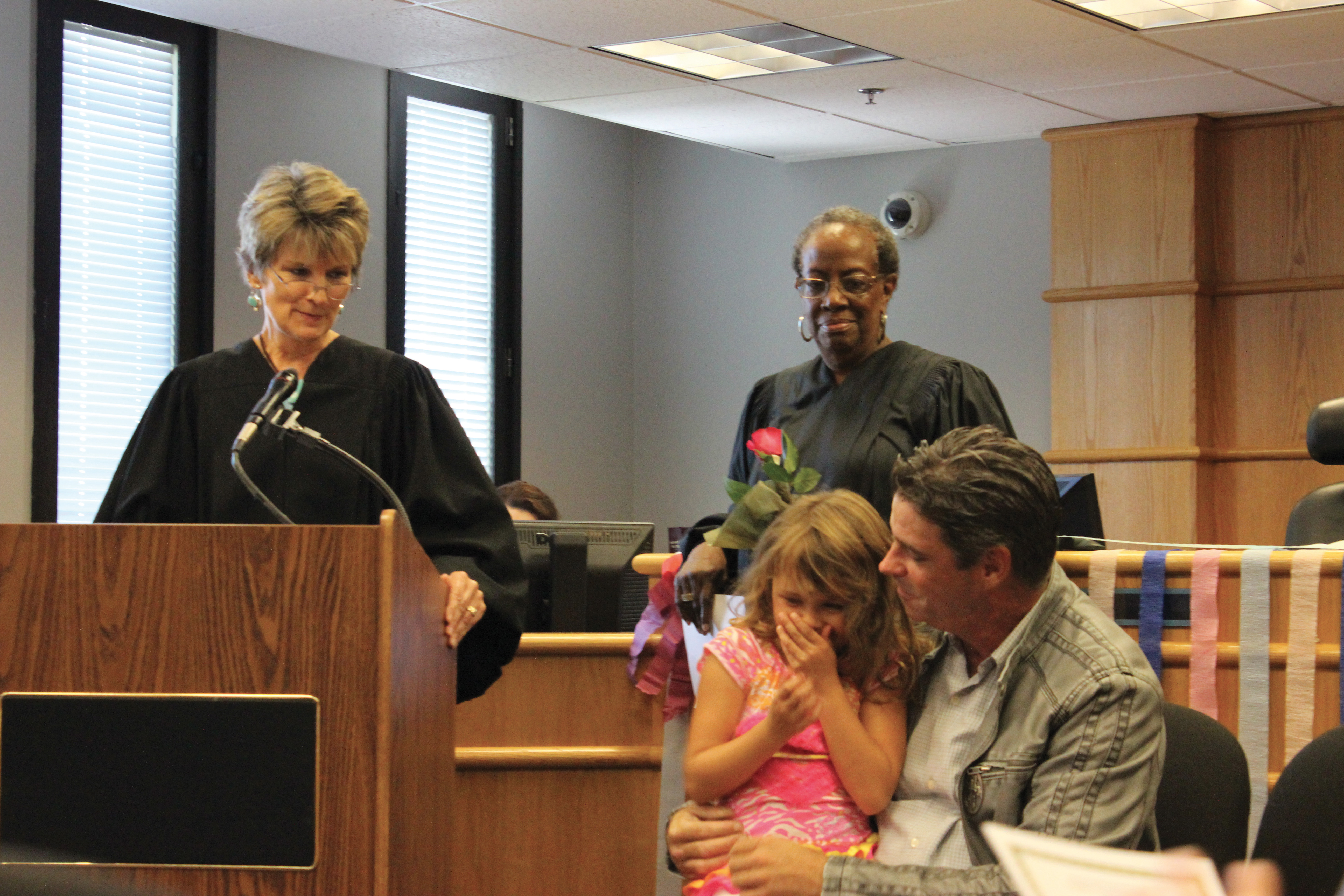
Photos courtesy of eyeWANG Pictures / PBS
Left to right: Judge Julia Garratt, Judge Patricia Clark, Natalya Brown and Patrick Brown at Patrick’s graduation from Family Treatment Court in Seattle.
Sometimes, there’s tough love. Other times, it’s just tough.
That’s the situation facing many parents who are trying to win back custody of children who have been placed in the child welfare system. The documentary “Tough Love,” which aired on PBS this summer, follows two such parents on opposite ends of the country as they try to navigate two very different systems.
Recovering methamphetamine addict Patrick Brown is trying to win back his daughter Natalya, who has been living with a foster family in Seattle. In New York, meanwhile, Bangladesh-born Hannah Siddique’s two children were placed with their father’s family after allegations of neglect; she’s trying to get them returned while expecting a third child with her new husband.
“I think there’s a lot of different takeaways from this film, depending on where you’re sitting at the table,” director-producer Stephanie Wang-Breal told Youth Today.
“For judges, I think it’d be great if they could have a little bit more compassion for the parents and think about the way we talk to parents. … In terms of social workers and foster parents, I think we need to think a little bit more about where these parents are coming from and what kind of childhood they came from before we can judge them.”
Wang-Breal said she got interested in the subject after making an earlier film about Americans adopting children from Chinese foster homes.
“At the screening of that film, people kept asking to look at the domestic foster care and adoption system,” she said. That led her to family courts and parents’ advocates meetings, where she met the people at the center of “Tough Love.” She followed Hannah for almost two years and Patrick for nearly a year and a half.
When the film begins, Patrick is in a rigorous but supportive court-managed program for recovering addicts. He has a team of court-appointed professionals working with him, and he’s on good terms with Natalya’s foster family. But in one of the most wrenching scenes, he gets hauled into court after admitting that he had blown his rent money at a casino during a lonely July 4 holiday without his daughter.
As Brown recounts his stumble, the camera focuses not on him but on the wincing reactions of others in the courtroom — his social worker, his daughter’s legal advocate, the judge. It’s an affecting bit of footage that came about because the embarrassed father asked not to be filmed during the hearing, Wang-Breal said.
“Everyone was really uncomfortable, because he was doing very well up until this point,” she said. “It’s like everyone could feel the walls crumbling around him.”
In New York, meanwhile, Hannah finds herself trying to fight a New York child welfare bureaucracy that comes across as a lot of tough without much love — especially for someone without money.

Hasna “Hannah” Siddique, Phillip “Philly” Toribio and Hannah’s two children ride the subway together during one of their weekend visits.
The city’s Administration for Children’s Services (ACS) not only gets to decide whether the two children who were taken from her custody when she was 19 would be returned, but also whether she’ll get to keep the daughter she’s now carrying.
And since ACS makes that call based partly on her living conditions, parent advocates tell a stunned Hannah she’d be better off leaving the small apartment that she and husband Philly share with Philly’s mother and going to a homeless shelter in hopes of qualifying for housing aid.
“To me, that was the saddest and most poignant part of the movie, because it’s also typical of the lack of coordination between different government agencies,” said David Tobis, the former executive director of the New York-based Fund for Social Change, who was involved in the city’s overhaul of its foster-care system as both an advocate and a government official.
“I‘ve heard endless stories of families shuttling back and forth between shelters and apartments that are not adequate, with plastic bags on their shoulders and their kids in their hands.”
[Related: Peer Mentoring: Youth Who Faced Mental Health Issues Now Aid Others]
Tobis said New York made great strides in reducing the number of kids in foster care from about 50,000 in the early 1990s to about 11,000 today. But it didn’t provide enough help for families whose children weren’t placed in foster care, he said.
Tobis called the documentary “excellent.”
“It’s sensitive to the needs and difficulties of parents, while also understanding the constraints that those people who administer the system are under as well,” he said.
Jennifer Reich, a University of Colorado-Denver sociology professor who has studied U.S. child welfare programs extensively, said many parents who are trying to get their children returned face similar problems — housing, child care, addiction, family support and finances — under intense court scrutiny.
A poor parent who needs an apartment can wait up to two years for federal housing aid, and if the parent doesn’t have custody, their children often can’t be included on applications for public health or child care, Reich said. Setting up a counseling session is far easier with private insurance than relying on a state or county clinic. An appointment of less than an hour can end up taking three if the parent relies on public transportation. And missed drug-testing dates can be reported to the court as a failed test, even if the parent gives a sample the next day.
“There are certain parents who maybe shouldn’t get their kids back,” Reich said. “But there are a lot of parents who don’t get their kids back because they can’t meet the bureaucratic expectations set by the state, not because they’re not going to be capable parents.”
Even in the Seattle program, which is tailored to recovering drug users, Patrick’s court-appointed lawyer fumes during one hearing at how much emphasis is being placed on her client’s finances.

Natalya Brown rides on her father Patrick’s shoulders during one of their weekend visits together.
“We do this to a lot of parents, which is we require them to do a lot of treatment programs that are in the middle of the day, and hearings that are in the middle of the day, and appointments and meetings that are in the middle of the day,” says the attorney, Alena Ciecko. “That interrupts individuals’ abilities to earn an income.”
Family court is “about safety, not about perfection,” Cieko tells the filmmakers later.
Wang-Breal said making the film has made her think that struggling parents need more help dealing with their problems up front, “instead of taking the kids away right away.”
The film has been screened for lawmakers on Capitol Hill, and one of the parent advocates who helped Hannah has been asked to testify to Congress about the need for that up-front support.
Reich said such support could include expanded programs to end drug and alcohol abuse, support for kids with disabilities and increased availability of child care, which is often “prohibitively expensive” for small children.
“We have a lot of information to identify the points where families struggle,” Reich said. “We could do more, but it would take a collective will to do so.”
The documentary is now available online at toughlovefilm.com.
More related articles:
Red Flag the Red-flag Case Notes or Face Disaster
New Federal Guidelines Aim to Protect Parents with Disabilities
Study: Intensive, Individualized Help Can Aid Foster Youth Move Into Adulthood






























